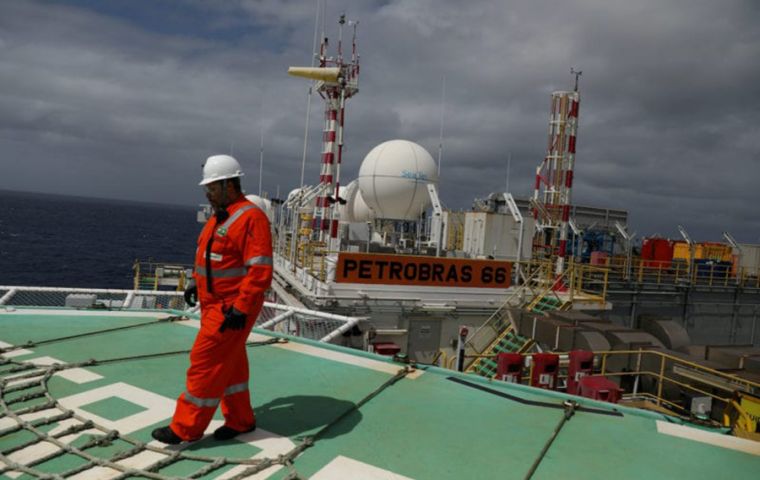MercoPress. South Atlantic News Agency
The virus has reached Petrobras offshore oil rigs; prosecutors investigations into the outbreaks
 Brazil had registered 1,427 confirmed coronavirus cases among offshore oil workers as of July 10, according to ANP
Brazil had registered 1,427 confirmed coronavirus cases among offshore oil workers as of July 10, according to ANP On Friday, May 1, two workers on the PXA-1 offshore platform owned by Brazil's state-run oil company Petrobras checked into the facility's infirmary complaining of headaches and fever-like symptoms. Another Petrobras employee fell visibly ill the following day, according to Brazilian media.
The sickness spread further in the subsequent days, stoking anxiety among the 45 workers onboard, all but one of whom later tested positive for the novel coronavirus, according to the local union.
While all have since recovered, the three workers said they are deeply embittered because they believe Petrobras failed to take now-standard precautions to prevent the spread of the virus, like testing workers before they went onboard rigs or providing them high-quality masks.
The three workers and Paolo Valterson, the local union's health director, questioned why the workers were not evacuated to the nearby city of Fortaleza in northeastern Brazil until four days after the first ones exhibited symptoms. They were quarantined in a hotel in the city for 15 days, according to Valterson.
In recent months the coronavirus has hit oil production and exposed Petrobras, which employs more than 45,000 people and is Latin America's largest company by most measures, to possible legal problems.
As of mid-June, federal prosecutors had opened 25 coronavirus-related investigations into the Rio de Janeiro-based company's conduct at maritime facilities alone, according to information obtained through a public information request.
Local prosecutors said in a statement they have opened a probe into the incident on the PXA-1 platform.
The company said it had administered more than 70,000 tests among its employees and subcontractors across the country. But that has not kept the virus from ripping through Brazil's roughly 155 offshore oil platforms, according to an analysis of public and confidential data and conversations with doctors, workers, executives and government officials.
Brazil had registered 1,427 confirmed coronavirus cases among offshore oil workers as of July 10, according to ANP, the country's oil regulator. That means around 3% of all workers in the sector have contracted the virus, which is about six times the average incidence in Brazil, home to the worst outbreak in Latin America.
Brazilian mining giant Vale SA and meatpacker JBS SA are among the companies that have been dealing with coronavirus outbreaks among their workers.
Those who work on offshore oil rigs are particularly susceptible to coming down with COVID-19, the respiratory illness caused by the virus, because they are aboard for weeks at a time and work, sleep and eat in close contact with one another.
Workers also have accused Petrobras of failing until early June to implement universal testing for workers departing to offshore facilities. Union officials were particularly irked the firm had donated 600,000 test kits to the federal and state governments by late April, according to company statements, even as union officials had demanded pre-departure tests as early as March.
While originally concentrated in southeastern Brazil, the heart of the country's oil industry, pre-departure testing later expanded to all parts of Brazil. The company said more than 43 per cent of its direct and indirect workers had been tested as of June 29, adding that the high incidence of coronavirus among offshore oil workers may be partially attributable to higher rates of testing than in Brazil as a whole.
Regarding its donations of test kits to federal and state authorities, Petrobras said it considers itself a “citizen company,” and, as such, it is responsible for safeguarding the health of the Brazilian people.
The 45 workers on the PXA-1 platform off the coast of Ceara were among those that had not been tested, even as the state and its capital Fortaleza had become one of Brazil's worst coronavirus hot spots by late April, according to Valterson, the union official.




Top Comments
Disclaimer & comment rulesCommenting for this story is now closed.
If you have a Facebook account, become a fan and comment on our Facebook Page!